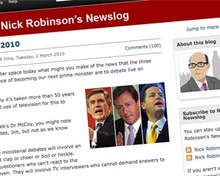
New media conversation is, at its worst, "self-important, narcissistic tosh", said the BBC journalist, whose Newslog started with a daily election campaign online diary in 2001. Robinson said he had stopped reading most of the responses on his blog: "It's a waste of my time."
Rather than widening the political debate commenters were "people who have already made their minds up, to abuse me, to abuse each other or abuse a politician", he said, at the Media Society event held at City University London on Tuesday, asking whether 2010 would be election 2.0.
"Life's too short: I've got a lot of people to talk to and talk about. We've [the BBC] tried to find a way of filtering that out, of having a proper debate and we've struggled," he said.
"I do think that's a danger in the new media: there isn't the room for the person who says 'excuse me I don't really know what that means for me'.
"There is lots of room for the person who says 'he's a crook, they're corrupt, they're wrong, they're New Labour (…)' There isn't room for what most people are like, which is 'excuse me can you tell me a bit more? I'm not sure, how will it affect me?'"
Robinson, said that he hadn't yet found Twitter and blogs to be response mechanisms for "articulate" comment.
"New media can take you the wrong way," said Robinson, adding that the recent National Bullying Helpline (NBH) story had reminded him to treat social media sources rigorously. The NBH were "being taken apart by people with real knowledge and experience", including many bloggers, but a subsequent poll published on "generally respected" blog ConservativeHome showing a Conservative lead was misleading and had been picked up by many outlets, said Robinson.
"The great danger for people like me is that we use [blogs] as a primary source of information. And a chill went down my spine (…) do not take stuff off the web and treat it as gospel," he said.
Instead it is "good old self-important narcissistic television" that will have a more of an impact than blogging on the outcome of election, he said, referring to the plans for televised debates involving David Cameron, Gordon Brown and Nick Clegg.
But with a nod to the new, Robinson suggested that the spontaneity of the new technology could have some influence on the election outcome.
"The cameraphone could change the election. A flash of anger, a gaffe got onto television quickly, would and could change an election and that will matter.
"I think we're already seeing how organisationally it's changing politics.
"I'm particularly struck by Sarah Brown on Twitter [who] by playing the small liberal agenda is trying to get back the middle class voters who abandoned Labour after the Iraq war and she is having some success according to figures."
Also speaking at the event chaired by BBC presenter Evan Davis, were DJ Collins, Google and YouTube's director of communications and public affairs, EMEA; Professor Ivor Gaber, City University London; Rupa Huq, blogger; Matthew McGregor, Blue State Digital (Obama's social media and web advisors); and Rishi Saha from the Conservative party's new media team.
Free daily newsletter
If you like our news and feature articles, you can sign up to receive our free daily (Mon-Fri) email newsletter (mobile friendly).









